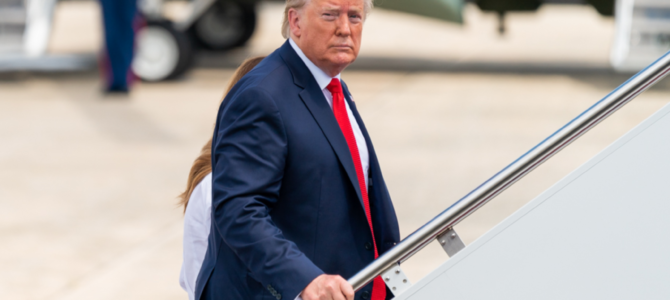
This fall has been punctuated by a steady drumbeat of President Trump’s assertions that the past two decades of U.S. military intervention in the Middle East were a grave mistake that remains to be corrected.
“Every once in a while, you have to change course,” Trump said in representative comments at a rally in Minneapolis this month. “The United States has spent $8 trillion in the Middle East. We’ve lost thousands of brave soldiers,” and in return for “all of the blood and treasure we sacrificed, made the Middle East less safe … less stable [and] less secure.” Now, he added, it’s time to exchange “lust for regime change” and “reckless foreign adventures” for a new approach, so “we’re going to bring our soldiers back home.”
Unfortunately, the Trump administration has yet to match such words with deeds. After multiple withdrawal announcements, the White House again has backed away from ending U.S. intervention in Syria. The troops who do “withdraw” are merely moving across the border to Iraq — a far cry from Trump’s promise to bring them home.
All told, more than 60,000 U.S. soldiers are deployed throughout the Middle East. If Trump is serious about his call to change course, he should actually bring them home — and if he’s concerned about pushback, Yemen is the perfect place to start.
American meddling in Yemen’s civil war is far from our largest, longest, or most expensive Mideast misadventure, but it is perhaps the most universally unpopular. Yemen stands out as the one recent war on which Congress could muster a vote to end U.S. involvement. Trump then vetoed the bill. Polling on the subject is scarce, but what few survey results are available show most Americans oppose continued U.S. intervention, and a mere 13 percent support ongoing arms sales to U.S.-partnered combatants, including Saudi Arabia and the United Arab Emirates.
That was before multiple investigations by the Pentagon and CNN found American weaponry in Yemen is now being used against the forces Washington supports. This weapons seepage was first reported at the beginning of this year, but months later, the problem has only gotten worse. Al Qaeda-linked fighters are among the militias found using U.S.-made gear, including armored vehicles, as are the Houthi rebels opposed by the U.S.-backed, Saudi-led coalition.
Just as we saw with similar arms distribution debacles in Afghanistan, Iraq, and Syria, the ubiquity of American weaponry is giving all sides in Yemen the ability to escalate and prolong the conflict. In this case, it’s a conflict that has created the world’s worst humanitarian crisis.
Millions are on the brink of starvation and dealing with a cholera epidemic and deadly shortages of basic medical supplies. The Saudi-led coalition — supported by Washington — has attacked hospitals, markets, funerals, weddings, schools, refugee camps, private homes, and, most infamously, at least one school bus full of little kids. Riyadh’s forces have been credibly accused of war crimes, and these atrocities are committed using American-made weaponry.
As is too often the case in today’s strategy-free foreign policy, there is no argument to justify this counterproductive disaster, nor is it necessary for American security. The outcome of Yemen’s civil strife matters very much for the ordinary Yemenis now suffering the effects of war and blockade, but it does not matter for the safety of the United States.
Our government’s intervention — unauthorized by Congress and unsupported by the American people — is disconnected from our national defense. Backing the Saudi coalition is making things worse for Yemen and undermines U.S. interests and values.
The accidental spread of U.S. weaponry to all sides of the fight encapsulates how dysfunctional our interference in Yemen truly is. Washington has enabled a Saudi-led campaign that has made Yemen less safe, less stable, and less secure.
Trump is commander in chief. It’s time for him to put his criticism of the failures of post-9/11 foreign policy into action and actually bring our soldiers home. It’s time to change course in the Middle East — and there’s no better place to start than Yemen.









